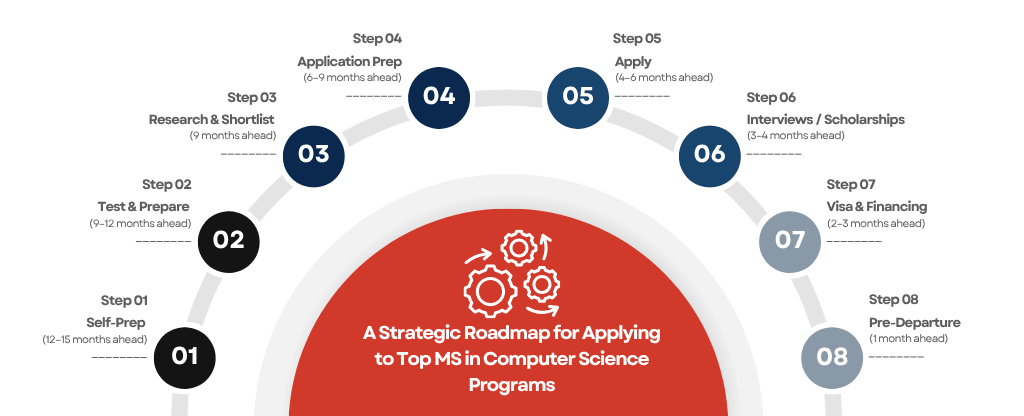Computer Science MS degree gives you access to the world of innovative research and work in the highest-level jobs and international employment.But, the selection of university count as well. There are thousands of choices throughout the US, UK, Canada, Germany and Australia, so how do you choose?
This guide will provide the best universities to pursue an MS in Computer Science abroad. We will discuss reasons to study abroad, the things to consider, the best countries and universities to study in, entry requirements, expenses and how to boost your application. Let’s begin.
Why Pursue MS in Computer Science Abroad?
Studying abroad for your MS offers many advantages:
- Faculty and research: Collaborate with world-renowned faculty: Collaboration across global faculties
- Modern labs and funding access: Innovate AI, data science and cybersecurity.
- Employment opportunities: In FAANG, Microsoft, Google, et cetera.
- Post-study work visas: 1 to 3 years of working in the global market.
- Cross-cultural exposure: Network, and leadership skills.
These benefits make masters in computer science programs abroad highly attractive.
Factors to Consider When Choosing a University
Picking the right university means weighing multiple factors:
- Program specialization: AI, ML, cybersecurity, databases, etc.
- Research opportunities: Labs, funding, publications.
- Industry links & placements: Internships and alumni networks.
- Global ranking & reputation: University and CS-specific reputation.
- Entry requirements: GPA, GRE/GMAT, English test scores.
- Tuition and cost of living: Varies widely by country and city.
- Work visa policy: Post-study work options matter.
- Location & culture: Lifestyle, safety, and language suitability.
Test yourself: are you focused on AI? Plan internships? Want easier visa rules? Write your priorities down and compare.
Top Countries to Study MS in Computer Science
Let’s look at countries frequently chosen by Indian students:
| Country | Benefits | Drawbacks |
| USA | World-class programs, large campus opportunities | High tuition & living costs, GRE/TOEFL needed |
| Canada | Cheaper, PGWP 3-year visa | Smaller research funding than US |
| UK | 1-year MS, high-ranked universities | Shorter degrees, limited visa work time |
| Germany | No tuition at public unis, strong engineering | German proficiency needed, high competition |
| Australia | 2-year MS, good scholarships | Costly living and tuition |
These are the top destinations to pursue best countries for MS in Computer Science.
Top Universities for MS in Computer Science Abroad
Here are top choices among best universities for MS in computer science, based on rank, research, and career outcomes:
| University | Country | Notable Programs |
| MIT (Massachusetts Institute of Technology) | USA | AI, Data Science, Robotics |
| Stanford University | USA | ML, Distributed Systems, Human–Computer Int. |
| University of California, Berkeley | USA | Computer Vision, Algorithms, Systems |
| University of Toronto | Canada | Big Data, AI, Computer Architecture |
| University of Waterloo | Canada | Software Engineering, Quantum Computing |
| University of Cambridge | UK | Theoretical CS, Cybersecurity |
| Imperial College London | UK | Computational Biology, Systems |
| ETH Zurich | Switzerland* | Cryptography, ML, Robotics |
| Technical University of Munich | Germany | Embedded Systems, Formal Methods |
| National University of Singapore | Singapore | AI, Networking, Security |
Though ETH is in Switzerland, it belongs to the same list of top EU tech schools.
These universities feature among the best computer science masters programs globally.
Admission Requirements
Entry criteria vary, but here are the usual expectations:
- Bachelor’s degree in CS or related field
- GPA: At least 3.0/4.0 or 60–65% in India
- GRE: 310+ for US top schools; optional for UK/Canada
- English test: TOEFL ≥ 90 or IELTS ≥ 6.5
- Statement of Purpose (SOP): Clear goals, projects, and fit
- Letters of Recommendation (LOR): 2–3 from academics or professionals
- Resume/CV: Highlighting projects, internships, and co-curriculars
- Transcript & academic records
Some universities may also request:
- Portfolio or GitHub links
- Research work or publications
- Interview or exams (rare)
Candidates who follow these guidelines are well-equipped for top computer science masters programs abroad.
Average Tuition Fees & Living Costs
One of the key factors for choosing among the best universities for MS in computer science is finance. Below is an overview of typical costs across top destinations.
Tuition & Living Cost Table
| Country & University | Tuition (USD/year) | Living Cost (USD/year) | Total/Year |
| MIT / Stanford / UC Berkeley (USA) | $55,000–$65,000 | $18,000–$22,000 | $73,000–$87,000 |
| Univ. of Toronto / Waterloo (Canada) | $25,000–$35,000 | $12,000–$15,000 | $37,000–$50,000 |
| Univ. of Cambridge / Imperial (UK) | $30,000–$45,000 | $15,000–$18,000 | $45,000–$63,000 |
| ETH Zurich / TUM (Europe) | €0–€1,500 (public) | €12,000–€15,000 | €12,000–€16,500 |
| NUS (Singapore) | $30,000–$40,000 | $12,000–$16,000 | $42,000–$56,000 |
Scholarships & Funding Options
Many universities and countries offer support:
- USA: Teaching assistantships, research assistantships, merit-based aid.
- Canada: Ontario Graduate Scholarship (OGS), Entrance Scholarships.
- UK & Europe: Commonwealth scholarships, university awards.
- ETH Zurich: Excellence scholarships (includes fee waiver and stipend).
- Singapore: Gov’t scholarships by agencies like NUS.
Tip: Research and apply early. Many funding schemes close 12+ months before intake.
How to Apply – Step-by-Step Process
Follow this systematic path to boost your chances at best universities for MS in computer science:

1. Self-Prep (12–15 months ahead)
- Finalize program specialization (AI, ML, cybersecurity).
- Maintain solid GPA (65%+ or 3.0/4.0).
- Plan GRE and English tests.
2. Test & Prepare (9–12 months ahead).
- Take GRE: aim 315+.
- English proficiency: TOEFL ≥ 100 or IELTS ≥ 7.0.
- Begin drafting SOP and resume.
3. Research & Shortlist (9 months ahead)
- List 6–8 universities across top, mid-range, and safe tiers.
- Check each program’s admission criteria and deadlines.
4. Application Prep (6–9 months ahead)
- Secure 2–3 LORs from former professors or supervisors.
- Finalize SOP, resume.
- Translate/attest transcripts as needed.
5. Apply (4–6 months ahead)
- Submit applications with required test scores.
- Pay application fees ($75–$125 per university).
- Verify document uploads; follow up on status.
6. Interviews / Scholarships (3–4 months ahead)
- Interview rounds typically in US/Canada programs.
- Apply separately for scholarships and assistantships.
7. Visa & Financing (2–3 months ahead)
- Get unconditional offer letter.
- Arrange funds and open blocked bank account.
- Apply for student visa with required documents.
8. Pre-Departure (1 month ahead)
- Attend orientation sessions.
- Apply for accommodation.
- Book flights and health insurance.
Tips to Strengthen Your Application
Here are actionable ways to make your application stand out:
1. GPA & Test Scores
- Prioritize academic performance (≥ 60%) and GRE scores (≥ 315).
- Retake tests if your initial scores are below requirements.
2. SOP Quality
- Tell a compelling academic and career story.
- Highlight research experiences, projects, and goals.
- Show true interest in each university (mention faculty or labs).
3. Letters of Recommendation
- Choose recommenders who know your academic strengths—studies or research.
- Provide them context: share your SOP and resume.
4. Research Experience
- Include internships, open-source projects, or published papers.
- Contribute to Github to showcase your coding skills.
5. Resume Clarity
- Use bullet points; mention technologies and measurable outcomes (e.g. “Reduced model time by 30%”).
- Keep it to one or two pages maximum.
6. Interview Prep
- Mock interviews help.
- Study common MS interview questions: project details, motivation, and future plans.
7. Apply Broadly
- Mix aspirational, mid, and safe universities.
- Aim to apply to at least 6 institutions to ensure acceptance.
8. Early Scholarship Applications
- Many awards close early.
- Highlight academic excellence and financial need.
Conclusion
Pursuing an MS in Computer Science abroad is more than just a degree it’s a leap into a future full of innovation, opportunities and growth. With so many top computer science master’s programs globally, the path ahead can feel overwhelming. That’s why understanding the best universities for MS in CS, their admission requirements, and their financial implications matters so much.
Making a confident choice means weighing not just tuition fees and rankings but also curriculum depth, career support and visa success rates.
Navigating international applications can feel overwhelming, especially when you’re trying to get into the best colleges for masters in computer science. That’s where guidance makes all the difference. Transglobal Overseas expert team walks with you every step of the way.
Admission is one thing, but success after graduating is another: a carefully thought-through trip will not only bring an individual through the door, but to success with a Fortune 500 company, perhaps starting his own, or pursuing a research career.
Choosing is broad and enjoyable: Do you want to study at an Ivy League school, will you be much less expensive in Europe, or do you want to study in an Asian tech hub?
Your next step? Get personalized guidance now.
Frequently Asked Questions
1. Which countries are best for pursuing MS in Computer Science?
USA, Canada, Germany, the UK and Australia are ranked as the best countries to study MS in Computer Science. The universities in these countries are among the best, they are research intensive and they several employment opportunities.
2. Are there any scholarships available for international students in this field?
Yes many universities and governments offer scholarships for international students in Computer Science. Some popular ones include DAAD (Germany), Fulbright (USA), Chevening (UK), and university-specific grants. These scholarships may cover tuition, living costs, or both.
3. Which universities have the highest global ranking for MS in Computer Science?
Top global universities for MS in CS include MIT, Stanford, Carnegie Mellon, University of Oxford, and ETH Zurich. These schools lead in research, teaching and industry connections. They rank high in QS and Times Higher Education rankings every year.
4. Is it necessary to have a Computer Science background to apply for MS in CS?
No it is not a must. Majority of the institutions take admissions of students who have been in related disciplines such as IT, Engineering, or Math. We will however require you to demonstrate good programming and Algorithm skills as well as general CS concepts either through coursework or work experience.
5. What are the popular specializations in MS in Computer Science abroad?
Popular specializations include Artificial Intelligence, Data Science, Cybersecurity, Software Engineering, Robotics, and Machine Learning. You can choose based on your interest or career goals. These fields are in high demand in tech industries.
6. Which English language proficiency tests are accepted for MS admissions?
Most universities accept IELTS, TOEFL, and sometimes PTE. You must meet the minimum score set by the university. Scores usually stay valid for two years so plan your test early.
7. What are the job prospects after completing MS in Computer Science abroad?
After MS in CS, job opportunities are great. The career can range from software developer, data scientist, AI engineer or cybersecurity expert. The countries such as USA, Canada and Germany offer good salaries and post-graduate work visas.
8. Do universities abroad require Letters of Recommendation (LORs) and Statement of Purpose (SOP)?
Yes, the majority of universities require LORs and SOP. LORs reflect the practices and competencies of a teacher or employer to you. SOP indicates your reasons to study that course and goals. These make you application stand out.




